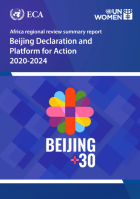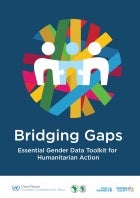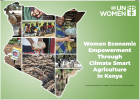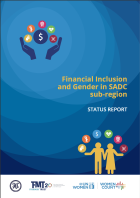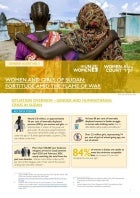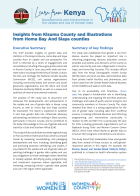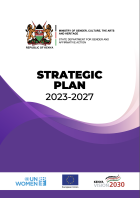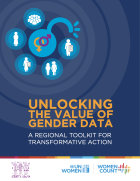Date:
The message that "Women’s rights are human rights" was strongly affirmed in the 1995 Beijing Declaration and Platform for Action (BPfA). Serving as a roadmap, the BPfA outlined clear objectives to tackle 12 critical issues impacting women and girls, including education, health, economic empowerment, political participation, and human rights. As the world marks the 30th anniversary of the BPfA in 2025, it serves as a solemn reminder that, despite progress, we are still far from fully achieving its goals.
Date:
This study provides an overview of the kinds of administrative data on discrimination and inequality currently being produced in 22 countries across Africa. It also identifies the data and capacity gaps as well as other barriers that prevent this kind of data from being used for statistical purposes. The recommendations of the study are aimed at helping producers and users of administrative data and statistics on discrimination and inequality improve the availability and accessibility of quality data. This can be done by for example improving data governance and statistical coordination, amongst other interventions. Increased accessibility and regular publication of this data will also contribute towards greater uptake and use and ultimately more informed decision making and better monitoring of discrimination and inequality on the continent.
Date:
Generation Equality is a global initiative that aims to drive change through a multigenerational and multi-stakeholder approach, focusing on key issues like equal pay, fair distribution of unpaid care work, eradicating gender-based violence, healthcare access, and increasing women’s political participation.
Date:
In alignment with the UN Sustainable Development Cooperation Framework 2024-2028, UN Women’s Global Strategic Plan, and stemming from the Government of Malawi’s Vision 2063, the Country Office Strategic Note articulates the strategic outcomes and corresponding outputs required to deliver results for women and girls in Malawi.
Date:
This toolkit is aimed at providing an easily accessible compendium of resources available for the production and use of gender data in humanitarian settings. It is tailored to build capacity and provide guidance to governments, civil society organizations (CSO), humanitarians working with data, information managers, managers, decision makers, statisticians, and users of gender statistics. The contained tools can be used in support of key humanitarian planning and operational processes, including advocacy, strategy and policy formulation, planning, resource allocation, monitoring, and evaluation.
Date:
The UN Women Kenya Annual Report highlights key achievements in advancing women’s empowerment and gender equality.
This report showcases progress in increasing women’s leadership and political participation, strengthening economic empowerment, eliminating violence against women and girls, engaging women in peace and security efforts, and enhancing planning and coordination.
UN Women Kenya remains dedicated to building a future where women are at the heart of developing resilient and sustainable communities.
Date:
This Care Framework highlights the context and challenges of women's unpaid care work in the West and Central Africa region. It also describes UN Women's approach to the care economy to address unpaid care within the context of the SDGs and the polycrisis in the region, and enabling gender equality and economic justice for rural and poor women.
Date:
Ethiopia has demonstrated thought leadership in the use of gender data to meet national priorities and address gaps to achieve these as well as SDG targets on gender equality and women’s empowerment (GEWE) and others. Gender data has notably been used to improve and safeguard education opportunities for girls, boost agriculture and productivity, particularly for female-headed households including through addressing land ownership, and to address issues of gender-biased violence.
Date:
The WEE-CSA Storybook showcases the success stories of over 2,400 women from Kitui, Laikipia, and West Pokot who have transformed their lives through climate-smart agriculture. Funded by KOICA and implemented by UN Women Kenya, it highlights the project's impact on livelihoods and gender equality while sharing valuable lessons learned. This collection celebrates resilience and aims to inspire further community upliftment for sustainable development in Kenya.
Date:
Women’s economic empowerment, financial independence, power and agency are facilitated through financial inclusion, using financial services and managing their own incomes. Empowering women economically drives social progress and mobility as women tend to invest their money in education and health. Financial inclusion also plays a pivotal role in achieving Agenda 2030.
Date:
This publication provides a detailed analysis of the ongoing humanitarian crisis in Sudan, focusing on its disproportionate impact on women and girls. As the country faces the largest internal displacement since the Syrian civil war, millions of Sudanese, particularly women and children, are grappling with severe challenges.
Date:
Kenya has demonstrated thought leadership in the use of administrative and citizen data for statistical purposes and harnessing official data to meet national priorities and SDG targets including on gender equality and women’s empowerment. This product highlights tangible achievements and lessons in improving access to and use of this data to influence policy and decision-making and improve the lives of women and girls in Kenya.
Date:
The Publication is a detailed strategic plan for the period 2023-2-27. It highlights previous achievements, lessons and emerging issues that define the policy direction of the gender sector achieving a society free from gender discrimination and violence
Date:
This report highlights some encouraging advancements. The information presented in this report is based on the latest available data (as of June 2024) on selected indicators in the global indicator framework for the Sustainable Development Goals.
Date:
This is a fact sheet for UN Women East and Southern Africa quarterly knowledge series which has been developed from a multi country analytical study on access to justice for women and girls in in East and Southern Africa conducted in 2021.
Date:
This Toolkit is designed to support the enhanced use of existing gender data and statistics in policy, advocacy, planning, and accountability in East and Southern Africa. The production and use of gender statistics is a complex process that requires deliberate efforts to connect, incentivize, and influence.The strategies outlined provide guidance and user-friendly tips on how to influence, direct, and monitor the pace of progress towards achieving gender equality and women’s economic empowerment and using gender data and statistics.
Date:
This product is related to the Be Like Tanzania series and part of an ongoing regional study. The study aims to showcase developments, achievements and lessons in the uptake and use of gender data and statistics in East and Southern Africa as part of experience-sharing and particularly south-south learning towards promoting the communication and use of gender data and statistics for policy- and decision-making to improve the lives of women and girls.
Date:
Notwithstanding the existence of various indicator frameworks and the Africa Gender Statistics Observatory, challenges regarding gender statistics data and capacity gaps remain within the AUC and across member states, underscoring the need for concerted efforts to expand on gender indicator frameworks and data availability, quality, and utilization. This assessment highlights the gender data and capacity gaps at the AUC and makes concrete recommendations how these can be filled.
Date:
This publication aims to identify the existing gender gaps in legal frameworks and policies to enable the integration of gender issues to increase the leadership roles of women and women with disabilities in local decision-making and ensure that they are equal beneficiaries of development interventions.
Date:
Discover the impact of the Affirmative Procurement Reform in West Africa project in empowering women entrepreneurs across Côte d’Ivoire, Mali, Nigeria, and Senegal. This newsletter showcases policy reforms, capacity-building initiatives, and success stories aimed at enhancing women's participation in procurement.

